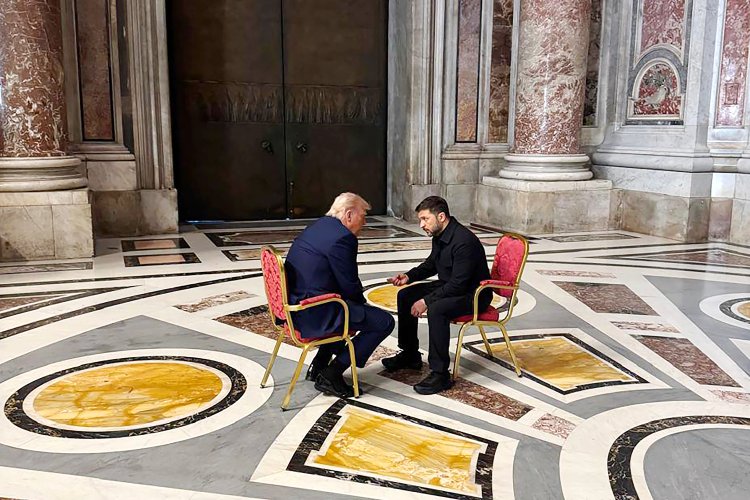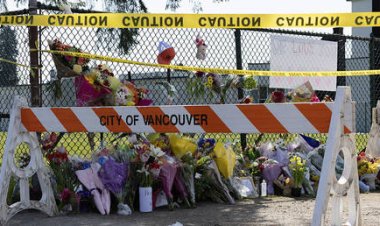Trump promised to conclude conflicts and balance trade. He's achieved a different outcome.
As the White House seeks to leverage the 100-day milestone, the administration is encountering setbacks in more conventional foreign policy areas.

However, at the end of his second term's first 100 days, the author of "The Art of the Deal" has yet to fulfill the substantial agreements he proposed.
“The president’s foreign policy orientation is both popular and makes sense: end wars, secure the border and fair trade. That's how he got elected,” remarked Ian Bremmer, president of the Eurasia Group, a nonpartisan risk-assessment organization based in New York. “But he is trying to do everything at once and his implementation has been disastrous so far. That's a big piece of why his approval ratings have shot down.”
Peace initiatives in the Middle East, efforts in Ukraine, and fresh trade agreements globally have been part of Trump’s campaign rhetoric suggesting simplicity in achieving these goals. This assertion has collided with reality since his return to the White House. Yet, his attempts are evident. Armed with four years of presidential experience, Trump aims for an even more ambitious agenda, seeking to fulfill his grandest promises and utilizing power politics to extract concessions from both allies and adversaries.
“Because the guard rails were gone, because there was no one to guide him or steer him in the way that was in the first term, he came out of the blocks acting upon the perspective that he's had about the world for the last 40 years. He went out and implemented it,” expressed Ivo Daalder, president of the nonpartisan Chicago Council on Global Affairs. “In the process, he’s destroyed the most important commodity the United States has had for the last 80 years, which is trust. Allies thought our values and interests mostly coincided and all of that’s gone.”
As the White House seeks to highlight this 100-day milestone, it also grapples with new evidence of its shortcomings in more conventional foreign policy areas. On Monday, Russia rebuffed Trump's suggestion to end the war in Ukraine, which he had vowed to resolve “on day one.” Hours later, Canadian voters responded emphatically to Trump’s intimidation about becoming America’s “51st state” by electing Liberal leader Mark Carney as their prime minister, marking a striking turnaround from initial expectations of a more Trump-aligned conservative victory.
Nevertheless, the White House remains unfazed by Trump’s declining approval ratings, confident that trade deals will soon emerge and other diplomatic efforts will yield results.
“With disruption, there's some volatility, but the long-term strategy is solid and will reap benefits,” stated National Security Council spokesperson Brian Hughes. “There's a lot of work to do. President Trump is doing it fast, but it all is on a single thread, which is an America First foreign policy.”
Trump has long been skeptical of America's values-based alliances with democratic allies, favoring a transactional approach. He has promised to reward countries that wish to invest in the U.S. while penalizing others. His aggressive stance has unsettled allies in Ottawa and Copenhagen and echoes imperialist sentiments reminiscent of the McKinley era, even as he seeks a legacy as a historic peacemaker.
To advance his objectives, Trump has empowered businessman Steve Witkoff to lead negotiations in the Middle East, addressing Iran and Russia simultaneously. He has initiated a military campaign against Iran-backed Houthis to reopen shipping lanes in the Red Sea, implemented stricter border measures—citing a significant decrease in apprehensions as a victory—and ignited a global trade war that may eventually foster new trade agreements but has primarily introduced economic uncertainty so far.
The administration points to various achievements, such as enhancing border security with Mexico and Canada, convincing Panama to withdraw from China’s Belt and Road Initiative, securing the release of 46 Americans held abroad, negotiating repatriation flights for noncitizens illegally in the U.S., and garnering over a trillion dollars in commitments from foreign investors. Moreover, two Trump allies outside the White House indicated a common thread behind Trump's attention to a sovereign wealth fund, the trade war, and a keen interest in territories like Greenland and Canada: reducing America's reliance on China by reshoring manufacturing and exploring new sources for critical minerals.
Hughes elaborated: “There's no greater force for peace and stability in this world than a strong America at home.” He noted that Trump’s overarching strategic aim is “protecting the Western hemisphere” and engaging globally—whether in Europe, Asia, or the Middle East—from a position of strength that he cultivates.
Numerous foreign leaders have visited the White House to put Trump at ease with flattery and concessions. Notably, El Salvador’s Nayib Bukele expressed deference during discussions about compliance with a Supreme Court order to return Kilmar Abrego Garcia, a Salvadoran native mistakenly deported and jailed, whom the administration has labelled an MS-13 gang member.
Yet, many of Trump's diplomatic efforts have been largely disregarded by both adversaries and allies.
Hamas continues to hold several Israeli hostages over a month after Trump's warning of “HELL TO PAY” if they did not release them immediately. Additionally, the proposal to forcibly relocate Palestinians from Gaza and transform it into a lavish “riviera” has faded from discussion, as regional allies are reluctant to accept resettled Palestinians, while Trump redirects his attention to the Ukraine conflict.
Witkoff has made multiple trips to Russia in attempts to engage Vladimir Putin. Trump has repeatedly echoed Kremlin narratives, pushing Ukrainian President Volodymyr Zelenskyy toward negotiations. When questioned last week about what concessions he expected from Moscow, Trump replied: “Stopping the war, stopping taking the whole country, pretty big concession.” This statement, downplaying the considerable challenges Russia has faced in the ongoing conflict, reaffirmed Trump's eagerness for a swift resolution.
“The Trump administration wants to get a peace deal and they don’t really care what the content of that peace deal is,” observed Jeremy Shapiro, research director at the nonpartisan European Council on Foreign Relations in Washington. “Russia would be idiots not to do it. They will get 90 percent of what they want and can always go back on it months later.”
However, Russia's foreign minister clarified on Monday that they were rejecting Trump's proposals—which have not been endorsed by Kyiv—that would recognize Russia's control over the Ukrainian territories currently occupied by its military.
Trump has also encountered difficulties in establishing rapport with China’s Xi Jinping, who has so far resisted engaging in trade discussions to reduce the elevated tariffs that, according to economists, are already impacting markets and consumers.
Last week, Trump told Time Magazine that Xi had contacted him, which Chinese officials quickly countered as false, showcasing a “degree of desperation” and exposing “weakness and the panic that [Treasury Secretary] Scott Bessent and others have,” according to Daalder. “They decided to go down a rabbit hole, and they’re stuck.”
The “reciprocal” tariffs Trump instituted on nearly every country were lifted within a week, with trade adviser Peter Navarro promising “90 deals in 90 days” while the tariffs were suspended. Thus far, however, none have come to fruition. Nonetheless, initial deals with nations such as Japan, Australia, India, and Argentina may be on the horizon in the coming weeks, while a reset with significant trading partners like Canada, Mexico, and the European Union appears to be distant.
The unexpected hostility exhibited by Trump and Vice President JD Vance—who admonished allies in Munich for being more tolerant of far-right parties and disparaged Europe as freeloading—has left both Europe and Canada feeling bruised. The harsh treatment of Zelenskyy during a visit to the White House on February 28, along with Trump’s lopsided diplomacy favoring Putin, has strained transatlantic relationships and prompted European leaders to pivot away from decades of reliance on the U.S.
The White House rejected claims that Trump is neglecting democratic allies, despite his threats regarding Greenland and his selective defense of NATO allies contingent on their defense spending.
“America is a better force for peace and security when it is strongest. And in order for us to get stronger, we have to insist that our allies do their fair share,” Hughes contended, referring to new defense spending commitments from several European allies as evidence of their ongoing alignment with the U.S. “If they're prepared to do their part, there's no better ally in the world than the American people.”
Jessica Kline for TROIB News
Find more stories on Business, Economy and Finance in TROIB business












